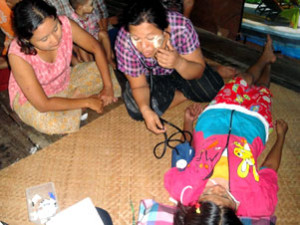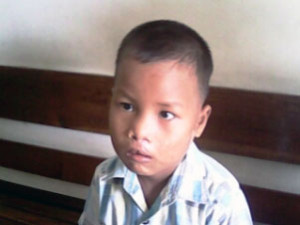The other day, I heard a new “horror story.” A woman in the northeast of the country (Chin State, near the India border) was hemorrhaging and needed a blood transfusion. Fourteen men in her village offered to be donors. Their blood was screened and 12 of the 14 were positive for HIV. The next needed task will be to get a group to go to that village, check the blood of the wives and partners of these positive men – and that of their children. Then to get those who are HIV-positive to get check-ups and treatment.
Most of the people in that village are migrant workers and it seems they went to a jade mine where they picked up the habit of shooting drugs and using the same needle. They came back addicted and still do not use clean syringes and needles There are only four places in the country for drug rehabitation, and it is a big problem here – plus alcoholism.
It’s a common story in Myanmar, where villages are separated from medical care by mountain ranges and long distances – and poverty. My life here interacts with the people – mostly those from the villages and different ethnic groups – whom I have met during almost eight years of presence here. My three main areas of mission have been trying to improve awareness, prevention and care for people with HIV/AIDS, improving education about and access to basic health care for pregnant women and others, and assisting students to continue their education beyond village-level possibilities. These activities keep me busy and very fulfilled. We are often called on to act quickly in emergency situations, too.

In the same hospital and almost at the same time, another mother having her first baby arrived – having had to borrow $250 to hire a riverboat to bring her to the hospital. She, too, had been in labor for more than 24 hours. She had a caesarian section and delivered twins weighing more than seven pounds each.
Without an immediate donation from a very generous supporter, these surgeries ($100 for the doctor and about $100 for anesthesia, supplies, and medicine) would not have been done. Those mothers, and probably their babies, would most likely have died, leaving two young widowed husbands feeling great guilt over the death of their wives and babies.
Neither of these mothers had any prenatal care – or even basic education. They had never traveled very far outside their village before this. I do have a dream connected with this and which I think could start a much-needed program here. It would be to hire a community organizer and a nurse midwife who would start a community-based healthy family program in a very poor industrial zone of Yangon (formerly Rangoon).
The program would involve developing people’s basic understanding of health, including human sexuality, identifying the women who are pregnant, and helping them to access needed services for good pre-natal and post-natal care – including testing for anemia, HIV, hepatitis, malaria and more, and getting treatment for these diseases which afflict so many here.
It would also include developing better community awareness and responsibility, providing needed education to parents, children, youth and spouses and partners concerning human sexuality, gender awareness and equality, and responsible relationships. We would also want to assure that the newborn babies get adequate nutrition, immunizations, and more, at least until they are two years old. As the program develops, I would hope that some of the mothers or others could be helped to develop income-generating programs and even to start small savings cooperatives.
When our staff accompanies sick people to consult in the hospitals or with the doctors, they are shown attention and respect. On their own, they wouldn’t dare to approach the doctors or hospitals – first because they have no money and, if they borrow, the interest rate is 20 percent a month.
That Paing Oo is an orphan who lives with his grandfather. He was born with a prominent cleft lip and cleft palate, and the grandfather, having no money, just felt sorry for him. He didn’t know what else to do. When the community health volunteer knew about him, he was referred, and with minimal costs for the surgery, his lip has already been repaired and he is beginning speech therapy. Surgery for his cleft palate will be done after six months.
Before his surgery, he could not be understood when he tried to speak. After his lip healed, he smiled broadly and kept saying, “I’m happy now!”
When he returned home to his 78-year-old grandfather, who was unable to leave the house – but in whose care the boy is – the grandfather and boy hugged each other repeatedly, and the grandfather said, “Now I can die in peace.”
– See more at: https://www.maryknollsisters.org/articles/saving-lives-myanmar#sthash.q3QXvJVN.dpuf

